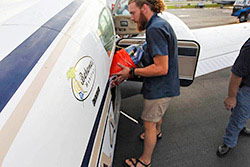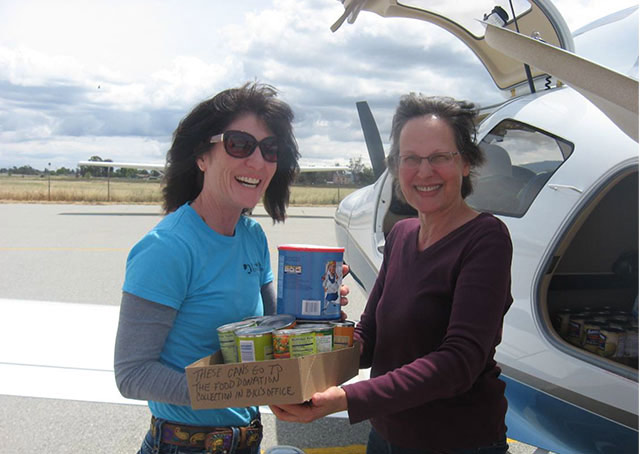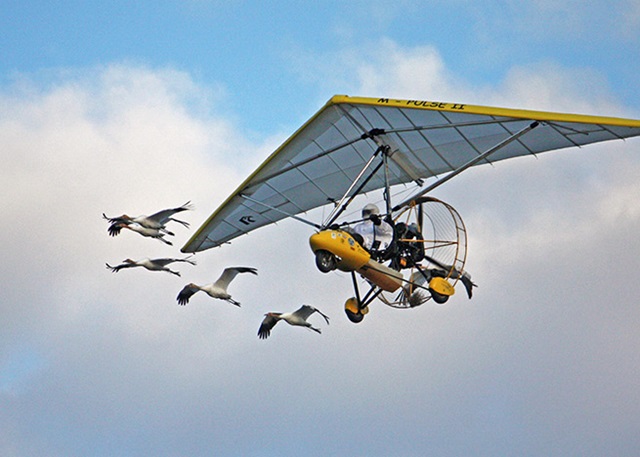Millions of Americans mark Sept. 11 by serving others in memory of the thousands who lost their lives on that terrible day in 2001. General aviation has a longstanding tradition of serving others, and it might surprise some just how many opportunities a pilot certificate and aircraft—even a small aircraft—can create to do good in the world.
The federal designation of Sept. 11 as a National Day of Service and Remembrance was born of a nonprofit group organized by a California marketing executive with roots in New York who sought to honor those lost and the compassion and service of those who joined the relief and recovery effort with a national day of service to others. Survivors and family members soon joined the effort, and in 2009 federal legislation was passed with bipartisan support establishing 9/11 as a day to serve others, and remember.
The nonprofit organization that spearheaded the early efforts continues to coordinate service opportunities and events around the country. GA has a long history of doing good work for others, and below are links to a range of organizations and information about how pilots can contribute, whether on Sept. 11 itself or in the future. (Organizations are listed in alphabetical order by category; most are operated as nonprofits.)
Medical airlift
Volunteer pilots and aircraft owners provide a critical, sometimes life-saving link for patients in need of specialized medical care in distant locations. Organizations dedicated to facilitating that abound; it is probably one of the most common uses of GA for serving others.
Air Care Alliance helps match patients in need with more than 60 organizations around the country that coordinate these missions. The Air Charity Network has the same basic focus and mission, coordinating efforts among various groups dedicated to medical transport as well as disaster relief and humanitarian missions.
Friends of Aviation is another resource for pilots and aircraft operators who want to contribute, offering links to organizations and information about qualifications, training, and mission planning.
In addition, there are many organizations that can be contacted directly through their websites.
- Angel Flight
- Children’s Flight of Hope
- Corporate Angel Network
- LifeLine Pilots
- Mercy Medical Angels
- Miracle Flights
- Northwoods Airlifeline
- Patient AirLift Services
- Veterans Airlift Command
- Volunteer Pilots Association
- Wings of Mercy
Humanitarian relief
Aircraft are critical links to the world in time of crisis, and organizations large and small have been established to coordinate aviation responses to crisis, both in the United States and around the world.

- Air Charity Network
- Bahamas Habitat
- Flying Samaritans
- LIGA International/Flying Doctors of Mercy
- Los Médicos Voladores (in Spanish, the flying doctors)
- Mission Aviation Fellowship
- Orbis
- Wings of Hope
Search and Rescue
Civil Air Patrol, the U.S. Air Force Auxiliary, finds lost aircrews and responds to natural disasters, as well as running programs that introduce youth to aviation.
Aviation experiences
The Experimental Aircraft Association’s Young Eagles Program has given nearly 2 million children and young adults their first GA experience, and launched many aviation careers in the process. Volunteer pilots are needed at events held regularly around the country.
Challenge Air gives children with special needs life-changing flight experiences.
Animal rescue transport
In addition to helping fellow humans, pilots also have created and continue to support animal rescue efforts, carrying four-footed passengers to new homes. Participating brings a unique satisfaction to many pilots.
Conservation
Several organizations support conservation by coordinating volunteer pilots and their aircraft with missions that include wildlife observation, aerial surveys, and related missions. GA pilots give scientists and other trained professionals a unique perspective on the environment.












